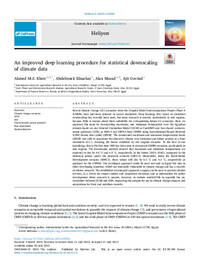An improved deep learning procedure for statistical downscaling of climate data

Authors:
Recent climate change (CC) scenarios from the Coupled Model Intercomparison Project Phase 6
(CMIP6) have just been released in coarse resolution. Deep learning (DL) based on statistical
downscaling has recently been used, but more research is needed, particularly in arid regions,
because little is known about their suitability for extrapolating future CC scenarios. Here we
analyzed this issue by downscaling maximum, and minimum temperature over the Egyptian
domain based on one General Circulation Model (GCM) as CanESM5 and two shared socioeconomic pathways (SSPs) as SSP4.5 and SSP8.5 from CMIP6 using Convolutional Neural Network
(CNN) herein after called CNNSD. The downscaled maximum and minimum temperatures based
CNNSD was able to reproduce the observed climate over historical and future periods at a finer
resolution (0.1◦), reducing the biases exhibited by the original scenario. To the best of our
knowledge, this is the first time CNN has been used to downscale CMIP6 scenarios, particularly in
arid regions. The downscaled analysis showed that maximum and minimum temperatures are
expected to rise by 4.8 ◦C and 4.0 ◦C, respectively, in the future (2015–2100), compared to the
historical period, under the moderate scenario (SSP4.5). Meanwhile, under the Fossil-fueled
Development scenario (SSP8.5), these values will rise by 6.3 ◦C and 4.2 ◦C, respectively as
analyzed by the CNNSD. The developed approach could be used not only in Egypt but also in
other developing countries, which are especially vulnerable to climate change and has a scarcity
of related research. The established downscaled approach’s supply can be used to provide climate
services, as a driver for impact studies and adaptation decisions, and as information for policy
development. More research is needed, however, to include multi-GCMs to quantify the uncertainties between GCMs and SSPs, improving the outputs for use in climate change impacts and adaptations for food and nutrition security.
